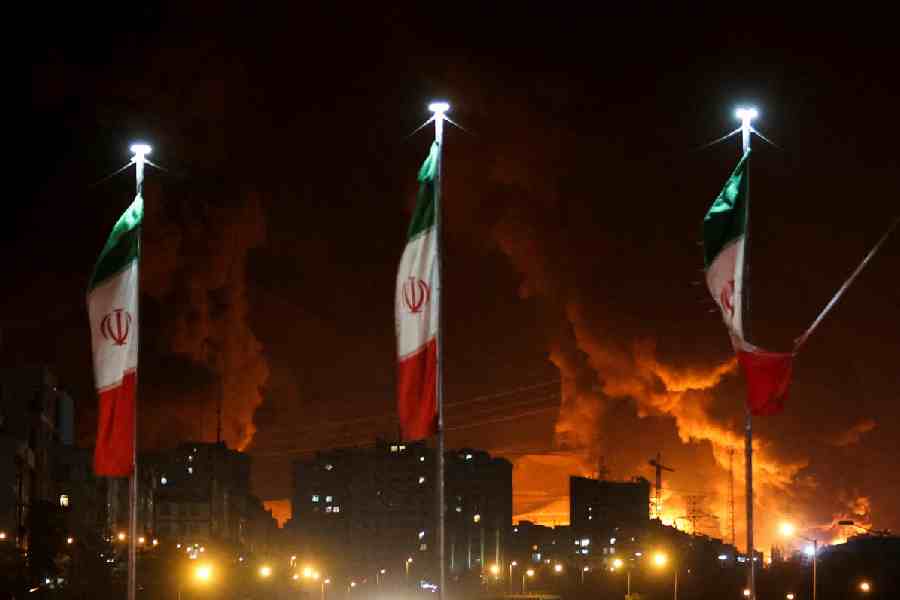The ruthless massacre of six million Jews during the Holocaust has transformed, over the decades, from tragedy to strategy. Menachem Begin, the former prime minister of Israel, initiated this transformation, making the Holocaust, or the Shoah as it was referred to in Hebrew, a foundation for the identity of the Jewish State. Israel self-identified as a child of the Holocaust. Those who questioned the portrayal of the Holocaust or asked hard questions of Israel were deemed anti-Semitic. Begin was not interested in garnering the world’s sympathy for Israel. Instead, the tormented child now wanted to become the schoolyard bully. The world owed Israel. Jewish-Americans ensured that the government of the United States of America never forgot about the Holocaust. The bully needed other bigger bullies in its corner. With their support, Israel, over the last 75 years, has embarked on a long and interminable campaign, not for peace but for payback.
Benjamin Netanyahu’s seemingly unprovoked strikes against Iran, following his inhuman counter-operation in Gaza, represent the natural evolution of Begin’s Zionist politics. But there comes a time when the justification of retaliation begins to wear thin. In international law, that moment is when the response crosses the bounds of what is necessary and proportionate. Israel has crossed that red line on multiple
occasions in Gaza. Now, in Iran, it has given up on that justification altogether. Prime Minister Netanyahu openly addressed the people of Iran and urged them to rise up against the clergy that runs that country. This is not a response in self-defence; it is an open declaration of war to oust a foreign government. Any refuge in the horrors of the Shoah
over eight decades ago cannot provide the moral high ground for Israel to brazenly attack another people. To call out such Israeli depredation is about as anti-Semitic as calling Mark Zuckerberg and his data mining practices exploitative.
None of this is to say that the Ayatollah in Iran is running a model government that serves its people well. But neither, according to many nations in the world, is Donald Trump. Merely because another country thinks that a foreign government is doing a disservice to its people does not provide any justification to attack it. This is especially when Iran and the US were about to
embark on a sixth round of talks on Iran’s nuclear programme. Irrespective of whether the talks would yield results or not, they were a civil way of addressing concerns. With Israel having attacked Iran’s nuclear facilities and its chief scientists, Iran rightly feels that it has been led up the garden path
by Israel’s chief ally, the US. One cannot be talking on the one hand and failing
to rein in one’s ally on the other.
It would be easy to blame the recent escalation on Trump’s foreign policy whimsy and on Netanyahu’s opportunism. But that would be missing the point. It has been consistent US policy to go along with Israel’s frequent muscle-flexing in the region. President Joe Biden was quick to justify Israeli actions in Gaza by stating that Hamas was beheading Israeli babies, though it was later clarified that he saw no images of the kind. Lyndon B. Johnson failed to press Israel hard enough after it promised to set up Jewish settlements in lands captured during the Six-Day war with Egypt. Wealthy and powerful Jewish-Americans have ensured that Israel has remained the beneficiary of American military largesse and steadfast foreign policy support. This is not about Trump’s predilections. If it were about that, Trump would have remained true to his promise to his MAGA base that the US will not intervene in other people’s wars. But that promise has now been swiftly cast aside. After all, when it comes to Israel, it is about the continuities in American foreign policy. Israel, in the US, continues to, in a manner of speaking, ‘stand on the feet of its six million dead’ as its former foreign minister, Abba Eban, had alluded to. As Pankaj Mishra has evocatively written, “the more remote the Shoah grew in time the more fiercely its memory was possessed by later generations of Jewish Americans.” Thanks to American domestic policy, Israel has been primarily viewed through this historical lens of suffering. It is time for the rest of the world to see things more clearly.
For India, it is critical to frame the issue of tensions among Israel, Palestine and, now, Iran right. It may be easy for India to be drawn into a simplistic binary of the conflict being one with the Muslim world on one side and non-Muslim countries like Israel and itself on the other. At the same time, there could be much empathy for Israel as another State that has been the victim of cross-border terrorism by non-State actors, an ongoing holocaust of sorts.
Several of these contemporary similarities have brought India much closer to Israel over the past decades. India is among the largest purchasers of Israeli weapons, including its drones, deployed successfully during Operation Sindoor. It recently abstained from a UN Resolution calling for an immediate and unconditional ceasefire in Gaza. Last week, it distanced itself from the Shanghai Cooperation Organisation resolution condemning Israeli strikes on Iran. Instead, it publicly called for both sides to work towards de-escalation.
India’s new foreign policy strategy, best described by the Narendra Modi government itself in 2014 as “enlightened national interest”, is implemented, as the foreign minister, S. Jaishankar, described it, “by identifying and exploiting opportunities created by global contradictions.” No doubt, this doctrine dictates a tightrope walk on the Israel-Iran conflict — buy high-end Israeli arms while getting Iranian oil, build Chabahar port in Iran while shipping rockets from Chennai port to Israel.
As India puts its pragmatic national interest over any firm ideological principle, it would do well to remember Mahatma Gandhi who wrote from Panchgani in July 1946 something that rings even truer today.
“I do believe that the Jews have been cruelly wronged by the world... But, in my opinion, they have erred grievously in seeking to impose themselves on Palestine with the aid of America and Britain and now with the aid of naked terrorism.”
Israeli actions in Gaza and in Iran can no longer be justified by Jewish suffering during and after the Holocaust. Just as Gandhi advised, India and the world need to judge Israeli actions on their own terms today. It’s time to drop the lenses that have become opaque with all the stars and stripes on them.
Arghya Sengupta is Research Director, Vidhi Centre for Legal Policy. Views are personal










